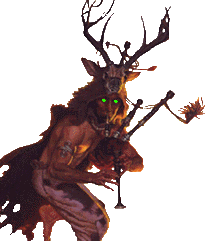
 The Winter Solstice is on December 21 |
|
Search for the roots of today's Christmas traditions and you will find your way back to the ancient Celtic festival of Alban Arthuan, held during the Winter Solstice on December 21. One of the principle reasons for the rapid propagation of Christianity throughout Europe during the first millennium was the willingness of Christian leaders to incorporate the rituals, beliefs and customs of other religions. Few of the ancient displaced religions were more assimilated than the Druids, Wiccans and Pagans. Alban Arthuan is one of the ancient Druidic fire festivals. Taking place on December 21st through 22nd (due to the method the Druids used to measure one day), Alban Arthuan coincides with the Winter Solstice. Translated, it means "The Light of Arthur," in reference to the Arthurian legend that states King Arthur was born on the Winter Solstice.
Alban Arthuan is also known as Yule, derived from the Anglo-Saxon "Yula," or "Wheel of the Year" and marked the celebration of both the shortest day of the year and the re-birth of the sun. Alban Arthuan was also believed to be a time of increased fertility, as were many of the other Fire Festivals, such as The custom of burning the Yule Log, the Yule-associated tradition that is most familiar to people today, was performed to honour the Great Mother Goddess. The log would be lit on the eve of the solstice, using the remains of the log from the previous year, and would be burned for twelve hours for good luck. Decorating the Yule tree was also originally a Pagan custom; brightly coloured decorations would be hung on the tree, usually a pine, to symbolize the various stellar objects which were of significance to the Pagans - the sun, moon, and stars - and also to represent the souls of those who had died in the previous year. The modern practice of gift giving evolved from the Pagan tradition of hanging gifts on the Yule tree as offerings to the various Pagan Gods and Goddesses. Some of the current traditions surrounding "Father Christmas" or Santa Claus can also be traced back to Celtic roots. His "elves" are the modernisation of the "Nature folk" of the Pagan religions, and his reindeer are associated with the "Horned God" (one of the Pagan deities). Although Christmas is a major holiday in Ireland, it is not widely celebrated in Scotland. Some historians have suggested that the reason Christmas is downplayed in Scotland is because of the influence of the Presbyterian Church or Kirk, which viewed Christmas as a "Papist", or Catholic event. As a result, Christmas in Scotland tends to be a sombre event, in direct contrast to the next Celtic festival, Hogmany, held on January 1. Hogmany is generally considered to be the much more significant celebration and it is a tradition that is beginning to spread outside of Scotland's borders. SBB, December, 1999 MORE Celtic Christmas Stories: The Celtic Origins of Mistletoe The Celtic Origins of Christmas: Alban Arthuan Links: |
Thursday, December 26th, 2019
Attention visitors: Tartans.com is back. Please note that this is a snapshot of the site as it existed nearly 20 years ago and you may encounter broken links; we are still combing through the site and correcting those as we find them. Please also note that some sections are currently not functional, primarily the discussion forums/clan chat boards.
|
** HOME - First Time Visitors - Glossary - - Contact Us ** Awards | Bibliography | Clan Calendar | Clan Chat | Clan Finder | History | Famous Scots | Genealogy | Great Hall of the Clans | Links | News and Features | Scots on the Net | Search | Site Map The Gathering of the Clans
Copyright 1995- Tartans.com - All Rights Reserved. |
